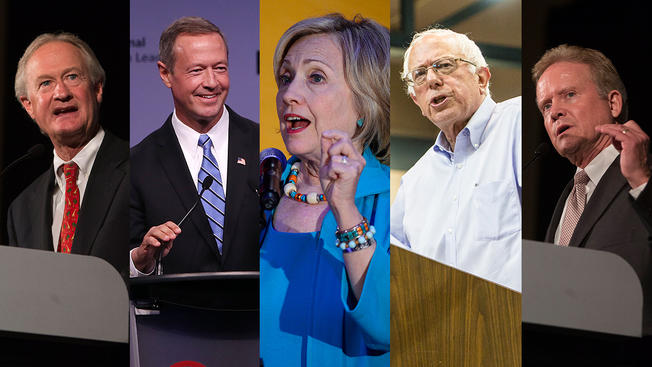The first Democratic Presidential debate of the 2016 season–held on October 13, 2015 in Las Vegas, Nevada–and the weeks that followed it, might have ended the fight for the Democratic nomination before it ever really started. Hillary Clinton, the clear favorite since essentially the time she left Barack Obama’s cabinet in 2013, entered the debate at one of her lowest points since her campaign kicked off. Insurgent candidate and Vermont Senator Bernie Sanders had overtaken her in multiple polls in the early voting states of Iowa and New Hampshire, and her national favorability had fallen to approximately 40%–down from close to 60% just two months prior. She could not escape the e-mail scandal that had plagued her throughout the summer, and the increasing speculation that Vice President Joe Biden would enter the race and challenge her for establishment support seemed to have shaken her confidence. The debate seemed to be the perfect stage for Sanders, or perhaps even one of the other candidates, to knock the former Secretary of State off of her frontrunner perch.
However, once the bright lights and eyes were on her, Clinton displayed all the qualities that had made her the perceived-inevitable nominee for so long. She displayed confidence, strength, and a command of the issues. She painted herself as tough, but likeable; progressive, but able to get things done. She successfully avoided speaking about email-gate–with an assist from Senator Sanders, who delivered perhaps the most memorable line of the night when he exclaimed that “Americans are sick and tired of hearing about [Clinton’s] damn emails”. When former Rhode Island Governor Lincoln Chafee disagreed and stated that he believed that the scandal should be discussed, Clinton refused to get into an argument, answering a succinct “no” when asked if she wanted to respond to Chafee’s assertions. While the other candidates struggled to attack her on perceived weaknesses such as her tendency to ‘flip-flop’ or her 2003 vote in favor of the Iraq War, she aggressively went after her most serious competitor, Sanders, when given the chance. She maintained that Sanders was “absolutely not” tough enough on gun control, citing his moderate support for more gun regulation, of the Vermont Senator’s most serious weak points for liberal voters.
Outside of his somewhat muddled response on guns, Sanders–a legislator from a state with 75% of all households possessing guns and with some of the loosest gun laws– also had a mostly strong performance. He continued to push his message of fixing income inequality, college tuition debt, and many other issues through what he describes as “Democratic-Socialist” policies. Although his supporters were undoubtedly pleased by his display, he did not take the opportunity to challenge Clinton, and may regret the decision given the positive reaction with which her performance was greeted.
On the stage that night, there were five candidates with former Maryland Governor Martin O’Malley, former Virginia Senator Jim Webb and Chafee joining the two highest-polling candidates. By the time the next debate–to be held on November 14 in Iowa–comes around, that number will be three. Shortly after the debate both Webb and Chafee, always long shot candidates, announced their decisions to withdraw. Neither candidate made a positive impression in the first debate, with Chafee struggling to answer why he voted to repeal Glass-Steagall (stating only that it was his first Senate vote and that his father had just passed away), and Webb will likely be remembered for constantly complaining about his lack of speaking time. Clinton’s consolidation as the favorite did nothing to help their chances. O’Malley was relatively strong, but he is very unlikely to capture the nomination, seemingly positioning himself for the ‘veepstakes’ if and when Clinton is nominated.
However, the biggest piece of news in the aftermath of the debate came from the candidate who was not present in Las Vegas. Concluding that he was out of time and perhaps discouraged by Clinton’s showing, Biden announced that he would not run for President just eight days after the debate. The combination of these factors shows that Hillary Clinton will come into the second debate full of confidence and with an eye on her potential Republican opponents in the general election.
By Blaise Malley


































































